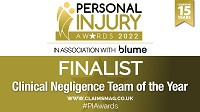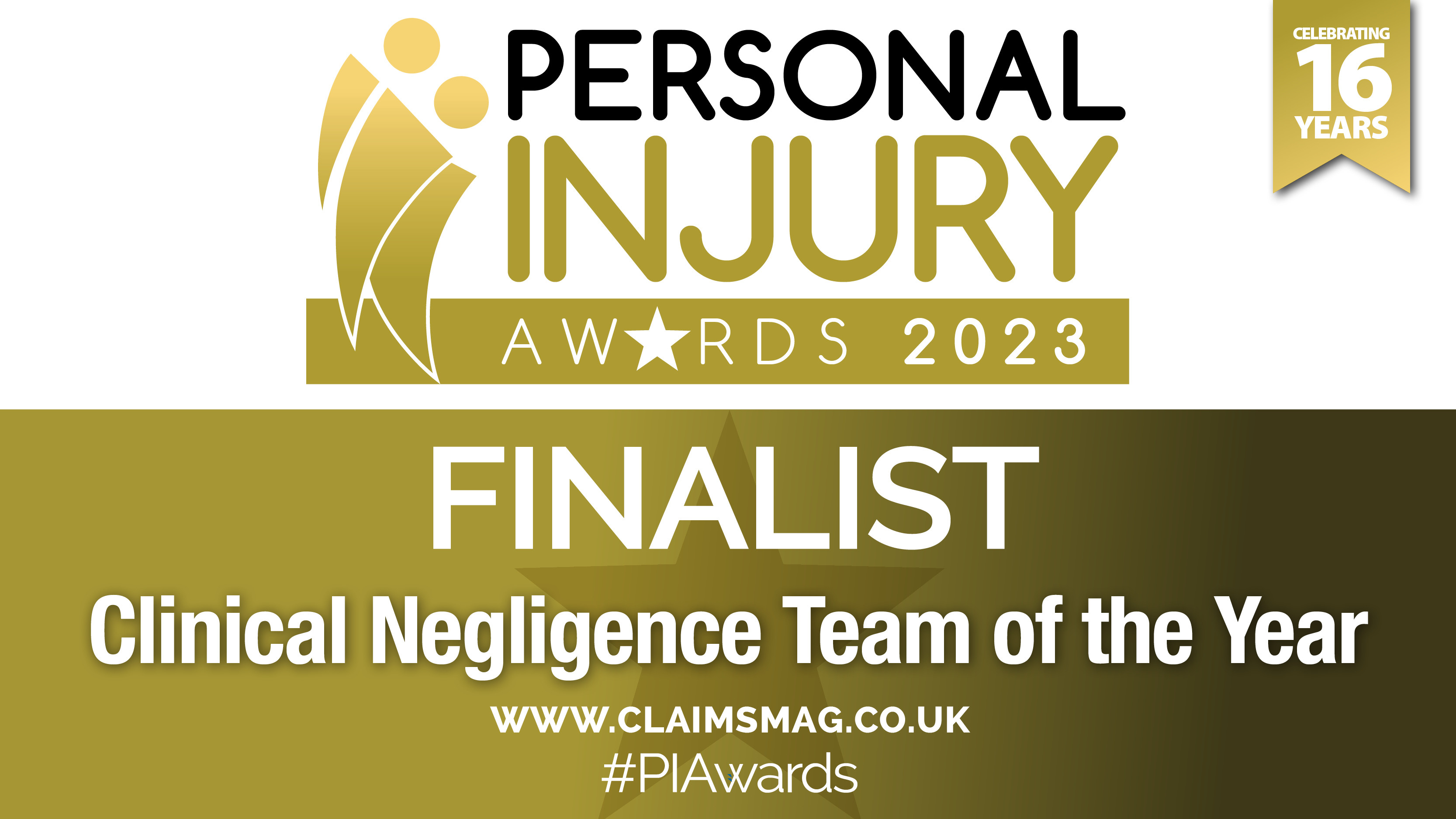Hospital Negligence Claims
If you have received substandard care at a private or NHS hospital and you are injured as a result, you may be able to claim compensation for your injuries.
More about Hospital Negligence Claims
Forbes Solicitors' hospital negligence solicitors offer expert legal advice to individuals who have suffered as a result of hospital negligence. Our experienced hospital negligence claims lawyers can assist with a range of issues, including misdiagnosis, surgical errors, and inadequate treatment. We understand the impact that hospital negligence can have on individuals and work to achieve the best possible outcome.

What is Hospital Negligence?
Hospital negligence refers to the failure of a hospital or its staff to provide appropriate care, which results in harm to the patient. This can take many forms, such as misdiagnosis, delayed treatment.
What is Hospital Negligence?
Hospital negligence refers to the failure of a hospital or its staff to provide appropriate care, which results in harm to the patient. This can take many forms, such as misdiagnosis, delayed treatment.


What is a Hospital Negligence Compensation Claim?
A hospital negligence compensation claim is a legal claim for compensation made by someone who has suffered harm as a result of hospital negligence. This can include medical expenses, loss of earnings, and pain and suffering. The compensation may also cover the costs of any ongoing care or treatment that may be required as a result of the negligent care.
If you have received substandard care at a private or NHS hospital and you are injured as a result, you may be able to claim compensation for your injuries.
Going to hospital can be a particularly distressing time, and can cause people to worry. Fortunately accidents rarely happen and patients are given the care they require. In some instances however, patients in hospitals can be neglected and the care they are supposed to receive is of a poor standard, resulting in injuries or worse.
What is a Hospital Negligence Compensation Claim?
A hospital negligence compensation claim is a legal claim for compensation made by someone who has suffered harm as a result of hospital negligence. This can include medical expenses, loss of earnings, and pain and suffering. The compensation may also cover the costs of any ongoing care or treatment that may be required as a result of the negligent care.
If you have received substandard care at a private or NHS hospital and you are injured as a result, you may be able to claim compensation for your injuries.
Going to hospital can be a particularly distressing time, and can cause people to worry. Fortunately accidents rarely happen and patients are given the care they require. In some instances however, patients in hospitals can be neglected and the care they are supposed to receive is of a poor standard, resulting in injuries or worse.

AnonymousJohn Bennett at Forbes has been patient, supportive and understanding. From the outset I felt that my case was in safe hands. Throughout the process I have found that John is happy to explain terminology and procedures so that I have felt reassured and comfortable.

Types of Hospital Negligence Claims
Hospital negligence claims differ from situation to situation making it difficult to decide whether there is a real case to bring against a hospital. Forbes Solicitors medical negligence team work with hospital negligence claims every day, and some of the most common issues brought to our attention include the following types of claims.
Patients Suffering Errors During Surgery
Needle Related Injuries
Substandard Care During Childbirth Leading To Complications
Misdiagnosis of Injuries or Illness Resulting in Further Injury or Complications
Prescription Errors
Dehydration
Failure to take patients history into account
Failure to note symptoms
Failure to operate when necessary
Failure to notice when a patient gets worse
Pressure sores
These are just a few examples of the type of issues Forbes Solicitors are experienced in claiming compensation for on behalf of clients.
If you have been injured whilst in hospital and believe it was due to negligence, it's vital you speak to the experienced and accredited team of solicitors at Forbes. Contact us on 0800 037 4625 today.
Types of Hospital Negligence Claims
Hospital negligence claims differ from situation to situation making it difficult to decide whether there is a real case to bring against a hospital. Forbes Solicitors medical negligence team work with hospital negligence claims every day, and some of the most common issues brought to our attention include the following types of claims.
Patients Suffering Errors During Surgery
Needle Related Injuries
Substandard Care During Childbirth Leading To Complications
Misdiagnosis of Injuries or Illness Resulting in Further Injury or Complications
Prescription Errors
Dehydration
Failure to take patients history into account
Failure to note symptoms
Failure to operate when necessary
Failure to notice when a patient gets worse
Pressure sores
These are just a few examples of the type of issues Forbes Solicitors are experienced in claiming compensation for on behalf of clients.
If you have been injured whilst in hospital and believe it was due to negligence, it's vital you speak to the experienced and accredited team of solicitors at Forbes. Contact us on 0800 037 4625 today.


Solicitors for Hospital Negligence
Hospital negligence cases are defended fiercely therefore, you need the very best legal team to help you claim compensation. Our clinical negligence lawyers at Forbes Solicitors have a proven track record in claiming compensation for clients and can help you get the compensation you deserve.
Your best interests are at the heart of everything we do. We fight to make sure you have access to any rehabilitation programmes, special care and treatments you may need as a result of your injuries.
All it takes is a phone call to get your hospital negligence claim started, call us today on 0800 037 4625.
We operate on a No Win No Fee basis, and offer a free initial chat with one of our expert solicitors. There is no obligation to proceed and all calls are completely confidential.
Solicitors for Hospital Negligence
Hospital negligence cases are defended fiercely therefore, you need the very best legal team to help you claim compensation. Our clinical negligence lawyers at Forbes Solicitors have a proven track record in claiming compensation for clients and can help you get the compensation you deserve.
Your best interests are at the heart of everything we do. We fight to make sure you have access to any rehabilitation programmes, special care and treatments you may need as a result of your injuries.
All it takes is a phone call to get your hospital negligence claim started, call us today on 0800 037 4625.
We operate on a No Win No Fee basis, and offer a free initial chat with one of our expert solicitors. There is no obligation to proceed and all calls are completely confidential.


Hospital negligence compensation
If you have suffered an injury or have had a loved one pass away due to hospital negligence, then you may be able to claim compensation. If you have a successful case, how much compensation you may get will depend on several factors, including:
The severity of your injuries - if the injuries sustained have led to a worse medical outcome or resulting in long term complications then the compensation payout will reflect this.
The treatment or rehabilitation needed now and in the future - as part of the compensation claim, you will need to be seen by an independent medical expert who will assess your injuries and determine what treatment you may need. Part of your compensation amount may reflect paying for treatment privately (if applicable).
Loss of earnings - if the injuries you have sustained have meant you had to take time off work, left you unable to work or meant that you cannot return to your previous career and had to change your role and this has had a negative effect on your earning potential, then you should be compensated for this.
Out of pocket expenses - this can include transport costs to and from hospital or treatment centre or other expenses you've incurred such as medical equipment etc.
Loss of enjoyment - you may also be awarded compensation if your injuries have meant you cannot carry on doing things that you used to enjoy before the hospital negligence incident took place. It may also be possible to claim compensation for any mental health issues or trauma your injuries have caused.
The compensation sum you may be awarded is generally used to pay for treatment such as rehabilitation that may not be available on the NHS, adaptations to your home or car (if needed), therapy such as counselling or physiotherapy and can also be used to pay for private medical care including a personal carer if needed.
If you think you have a hospital negligence claim, contact our expert medical negligence solicitors. We will listen to your story and, if you have a case, will help every step of the way.
Hospital negligence compensation
If you have suffered an injury or have had a loved one pass away due to hospital negligence, then you may be able to claim compensation. If you have a successful case, how much compensation you may get will depend on several factors, including:
The severity of your injuries - if the injuries sustained have led to a worse medical outcome or resulting in long term complications then the compensation payout will reflect this.
The treatment or rehabilitation needed now and in the future - as part of the compensation claim, you will need to be seen by an independent medical expert who will assess your injuries and determine what treatment you may need. Part of your compensation amount may reflect paying for treatment privately (if applicable).
Loss of earnings - if the injuries you have sustained have meant you had to take time off work, left you unable to work or meant that you cannot return to your previous career and had to change your role and this has had a negative effect on your earning potential, then you should be compensated for this.
Out of pocket expenses - this can include transport costs to and from hospital or treatment centre or other expenses you've incurred such as medical equipment etc.
Loss of enjoyment - you may also be awarded compensation if your injuries have meant you cannot carry on doing things that you used to enjoy before the hospital negligence incident took place. It may also be possible to claim compensation for any mental health issues or trauma your injuries have caused.
The compensation sum you may be awarded is generally used to pay for treatment such as rehabilitation that may not be available on the NHS, adaptations to your home or car (if needed), therapy such as counselling or physiotherapy and can also be used to pay for private medical care including a personal carer if needed.
If you think you have a hospital negligence claim, contact our expert medical negligence solicitors. We will listen to your story and, if you have a case, will help every step of the way.


Deceased spouse as a result of poor care at the hospital: Case Study
The Claimant claimed on behalf of their deceased spouse (the Deceased) who had died under the care of the Defendant trust. The Deceased was first admitted to Lancashire Teaching Hospitals NHS Trust in April 2021 and admitted for surgery in May 2021. After two further surgeries in June, the Deceased was diagnosed with a possible intra-abdominal collection, acute kidney injury with metabolic acidosis and possible hospital acquired pneumonia. During the admissions the Deceased developed a number of pressure ulcers, which had not been correctly documented, assessed and recorded and the care plan which was in place to manage the injuries was poorly adhered to. The Deceased unfortunately passed away in September 2021 due to suspected sepsis as a result of the poor care received by the Defendant.
The Claimant alleged that between April 2021 and August 2021 whilst the Deceased was under the care of Royal Preston Hospital, they had developed numerous pressure ulcers that were allowed to deteriorate. There were repeated negligent failures in correctly identifying, risk assessing and/ or responding appropriately or to adequately prevent and treat the development of pressure ulcers. This led to severe sepsis. There were also repeated failures in providing medication in a timely fashion and in managing the Deceased’s dehydration, malnutrition and hygiene, and fitness to be discharged home. An inquest was held to determine whether the Deceased would have survived, but for this gross neglect. It was found that the pressure sores had contributed to the death.
Despite oral evidence from a treating clinician at the trust the Defendant would not admit that the negligence caused or materially contributed to the death. This conduct left the Claimant with no other option but to issue proceedings in March 2024. This incurred a court fee of £2,250 after several attempts to narrow the issues and negotiate settlement without the need to place the matter in court. When the defence was due to be filed at court, the Defendant made an offer to settle for £35,000 in May 2024, and the claim settled at £38,000, days later. The figure reflected the entitlement of the spouse to claim for bereavement and funeral expenses under the Fatal Accidents Act 1976. The figure acknowledged that the Defendant accepted that they had caused the death, but without making a formal admission. The original offer from the Defendant had been £12,000.
Deceased spouse as a result of poor care at the hospital: Case Study
The Claimant claimed on behalf of their deceased spouse (the Deceased) who had died under the care of the Defendant trust. The Deceased was first admitted to Lancashire Teaching Hospitals NHS Trust in April 2021 and admitted for surgery in May 2021. After two further surgeries in June, the Deceased was diagnosed with a possible intra-abdominal collection, acute kidney injury with metabolic acidosis and possible hospital acquired pneumonia. During the admissions the Deceased developed a number of pressure ulcers, which had not been correctly documented, assessed and recorded and the care plan which was in place to manage the injuries was poorly adhered to. The Deceased unfortunately passed away in September 2021 due to suspected sepsis as a result of the poor care received by the Defendant.
The Claimant alleged that between April 2021 and August 2021 whilst the Deceased was under the care of Royal Preston Hospital, they had developed numerous pressure ulcers that were allowed to deteriorate. There were repeated negligent failures in correctly identifying, risk assessing and/ or responding appropriately or to adequately prevent and treat the development of pressure ulcers. This led to severe sepsis. There were also repeated failures in providing medication in a timely fashion and in managing the Deceased’s dehydration, malnutrition and hygiene, and fitness to be discharged home. An inquest was held to determine whether the Deceased would have survived, but for this gross neglect. It was found that the pressure sores had contributed to the death.
Despite oral evidence from a treating clinician at the trust the Defendant would not admit that the negligence caused or materially contributed to the death. This conduct left the Claimant with no other option but to issue proceedings in March 2024. This incurred a court fee of £2,250 after several attempts to narrow the issues and negotiate settlement without the need to place the matter in court. When the defence was due to be filed at court, the Defendant made an offer to settle for £35,000 in May 2024, and the claim settled at £38,000, days later. The figure reflected the entitlement of the spouse to claim for bereavement and funeral expenses under the Fatal Accidents Act 1976. The figure acknowledged that the Defendant accepted that they had caused the death, but without making a formal admission. The original offer from the Defendant had been £12,000.


Laparotomy: Case Study 2
The Claimant was admitted to the Intensive Care Unit for an emergency laparotomy. A central line was inserted on the Intensive Care Unit by the ICU Consultant using landmark technique, subclavian line, for vasopressor and total parenteral nutrition (TPN) administration. A chest x-ray was performed, and the line was deemed ok to use. 3 days post insertion and usage, the line became difficult to use with high infusion pressure, and a blood gas analysis suggested arterial placement. The line was transduced and found to be intra-arterial. Vascular opinion was sought which suggested anticoagulation, and interventional radiology opinion for advice regarding safe removal was sought.
The Claimant was transferred to another Hospital for specialist radiology input and had a joint interventional radiology/vascular procedure to remove the intra-arterial central line. During the procedure the Claimant woke with abnormal neurology and further imaging demonstrated bilateral acute cerebral infarcts. The Stroke Team reviewed the Claimant and considered prognosis and chances of meaningful recovery were poor. The Intensive Care Team planned for extubating and the Claimant was made ‘not for resuscitation’. The Claimant was placed on end-of-life care and died 3 days later.
A claim was brought on behalf of the Estate of the Claimant alleging that the central venous catheter was found to be intra-arterial, rather than intravenous. Several opportunities were available to confirm the correct placement. The chest x-ray was reviewed by two other Consultants, who both misinterpreted the incorrect line placement as x-ray film rotation. It was the Claimant’s case that on the balance of probabilities, if the Deceased had been managed appropriately, they would have made a full recovery and would have been discharged home, subsequently making a full recovery, and returning to their previous level of activity within a few months.
The Defendants admitted negligence at the pre-litigation stage and offered the Claimant £200,000, which was accepted.
Laparotomy: Case Study 2
The Claimant was admitted to the Intensive Care Unit for an emergency laparotomy. A central line was inserted on the Intensive Care Unit by the ICU Consultant using landmark technique, subclavian line, for vasopressor and total parenteral nutrition (TPN) administration. A chest x-ray was performed, and the line was deemed ok to use. 3 days post insertion and usage, the line became difficult to use with high infusion pressure, and a blood gas analysis suggested arterial placement. The line was transduced and found to be intra-arterial. Vascular opinion was sought which suggested anticoagulation, and interventional radiology opinion for advice regarding safe removal was sought.
The Claimant was transferred to another Hospital for specialist radiology input and had a joint interventional radiology/vascular procedure to remove the intra-arterial central line. During the procedure the Claimant woke with abnormal neurology and further imaging demonstrated bilateral acute cerebral infarcts. The Stroke Team reviewed the Claimant and considered prognosis and chances of meaningful recovery were poor. The Intensive Care Team planned for extubating and the Claimant was made ‘not for resuscitation’. The Claimant was placed on end-of-life care and died 3 days later.
A claim was brought on behalf of the Estate of the Claimant alleging that the central venous catheter was found to be intra-arterial, rather than intravenous. Several opportunities were available to confirm the correct placement. The chest x-ray was reviewed by two other Consultants, who both misinterpreted the incorrect line placement as x-ray film rotation. It was the Claimant’s case that on the balance of probabilities, if the Deceased had been managed appropriately, they would have made a full recovery and would have been discharged home, subsequently making a full recovery, and returning to their previous level of activity within a few months.
The Defendants admitted negligence at the pre-litigation stage and offered the Claimant £200,000, which was accepted.


Fall in Hospital: Case Study 3
The Claimant fell at the Defendant’s hospital, where they had chosen to undergo a knee replacement under a ‘choose and book’ system. Whilst an inpatient at hospital, the Claimant fell and suffered a right ankle fracture. This required surgery by way of an open reduction and fixation surgery to the ankle which was later placed in an air boot.
The Defendant admitted that it had negligently caused the right ankle fracture.
The mobility of the Claimant remained impaired following the surgery. The knee replacement was considered to have failed. The complication of the case was the apportionment of the failed knee replacement and the ankle fracture towards the ongoing care needs of the Claimant. In addition, the Claimant was diagnosed with dementia.
Medical reports were obtained from a care and mobility expert, and an orthopaedic expert on what was caused by, and the prognosis from the knee and ankle injuries. A capacity assessment was required, and the level of care required on account of the injury as opposed to the dementia was in issue. A life expectancy report was obtained.
The case was issued in Court. The defendant made an offer at £12,000 and the case concluded at a joint settlement meeting between the parties for £167,000. This figure was approved by the Court and the damages placed in a Personal Injury Trust.
Fall in Hospital: Case Study 3
The Claimant fell at the Defendant’s hospital, where they had chosen to undergo a knee replacement under a ‘choose and book’ system. Whilst an inpatient at hospital, the Claimant fell and suffered a right ankle fracture. This required surgery by way of an open reduction and fixation surgery to the ankle which was later placed in an air boot.
The Defendant admitted that it had negligently caused the right ankle fracture.
The mobility of the Claimant remained impaired following the surgery. The knee replacement was considered to have failed. The complication of the case was the apportionment of the failed knee replacement and the ankle fracture towards the ongoing care needs of the Claimant. In addition, the Claimant was diagnosed with dementia.
Medical reports were obtained from a care and mobility expert, and an orthopaedic expert on what was caused by, and the prognosis from the knee and ankle injuries. A capacity assessment was required, and the level of care required on account of the injury as opposed to the dementia was in issue. A life expectancy report was obtained.
The case was issued in Court. The defendant made an offer at £12,000 and the case concluded at a joint settlement meeting between the parties for £167,000. This figure was approved by the Court and the damages placed in a Personal Injury Trust.


Pressure Sores in Hospital: Case Study 4
The Claimant was admitted to Royal Preston Hospital for a urinary tract infection. Their pressure areas were examined, during which it was recorded they had presented with some blanching erythema to the sacrum with bruising.
The Claimant was rolled to provide pressure relief overnight causing a skin tear to their arm when the Health Care Assistants put a gown on. A wound chart was completed, and a skin assessment was also carried out on this day. The results of the skin assessment were that the Claimant had a skin tear to their left forearm, blanching erythema of both heels, as well as bruises to the left hip, left ACF, top of the left arm and the outside of the left buttock.
During the following 2-month period in Hospital, pressure ulcers were allowed to develop and deteriorate. The Claimant alleged there was a repeated negligent failure to identify, risk assess and/ or respond appropriately to the Claimant’s developing pressure ulcers.
A Serious Investigation Review revealed that there were repeated failures to follow guidance on turning and repositioning in adults at risk of developing pressure ulcers, a failure to provide pressure relieving equipment, a failure to adequately treat the Claimant’s pressure sores and a failure to provide adequate skin inspections. After a 6-week prolonged stay in hospital the Claimant’s sacral area had developed into a Stage 4 pressure ulcer.
It was the Claimant’s case that the Claimant suffered a period of 6 weeks pain and suffering and that had they been managed more appropriately, the Claimant would have made a full recovery and would have been discharged home much sooner.
The Defendants admitted negligence at the pre-litigation stage and offered the Claimant £5,500, which was accepted.
Pressure Sores in Hospital: Case Study 4
The Claimant was admitted to Royal Preston Hospital for a urinary tract infection. Their pressure areas were examined, during which it was recorded they had presented with some blanching erythema to the sacrum with bruising.
The Claimant was rolled to provide pressure relief overnight causing a skin tear to their arm when the Health Care Assistants put a gown on. A wound chart was completed, and a skin assessment was also carried out on this day. The results of the skin assessment were that the Claimant had a skin tear to their left forearm, blanching erythema of both heels, as well as bruises to the left hip, left ACF, top of the left arm and the outside of the left buttock.
During the following 2-month period in Hospital, pressure ulcers were allowed to develop and deteriorate. The Claimant alleged there was a repeated negligent failure to identify, risk assess and/ or respond appropriately to the Claimant’s developing pressure ulcers.
A Serious Investigation Review revealed that there were repeated failures to follow guidance on turning and repositioning in adults at risk of developing pressure ulcers, a failure to provide pressure relieving equipment, a failure to adequately treat the Claimant’s pressure sores and a failure to provide adequate skin inspections. After a 6-week prolonged stay in hospital the Claimant’s sacral area had developed into a Stage 4 pressure ulcer.
It was the Claimant’s case that the Claimant suffered a period of 6 weeks pain and suffering and that had they been managed more appropriately, the Claimant would have made a full recovery and would have been discharged home much sooner.
The Defendants admitted negligence at the pre-litigation stage and offered the Claimant £5,500, which was accepted.


Knee replacement aftercare: Case Study 5
The Claimant chose to undergo a knee replacement at a Leeds hospital. There was no issue with the knee operation, but the aftercare was substandard. The Claimant was provided with a compression pad to assist in maintaining blood flow throughout the leg. Whilst in hospital overnight the compression pad was left in place. The bottom of the bed frame was not removed. This caused a blister.
The hospital commenced a Datix Event Management Form in relation to the blister.
The hospital initially denied liability and that their negligence had caused the blister. Instead, they advanced the argument that a theatre canvas had been left in situ but argued that did not amount to a breach of duty and would be unlikely to cause the damage. The Claimant argued that it was inconceivable that the defendant would establish that this failing had not caused or materially contributed to the pressure sore. The Claimant argued that no responsible nurse would have left it overnight.
The Claimant sustained a necrotic ulcer to the sole of their left foot suffered with associated pain. This in turn caused an extended period of rehabilitation for the knee replacement.
The Defendant settled the claim pre-litigation in the sum of £5,000. No medical evidence was obtained or required.
Knee replacement aftercare: Case Study 5
The Claimant chose to undergo a knee replacement at a Leeds hospital. There was no issue with the knee operation, but the aftercare was substandard. The Claimant was provided with a compression pad to assist in maintaining blood flow throughout the leg. Whilst in hospital overnight the compression pad was left in place. The bottom of the bed frame was not removed. This caused a blister.
The hospital commenced a Datix Event Management Form in relation to the blister.
The hospital initially denied liability and that their negligence had caused the blister. Instead, they advanced the argument that a theatre canvas had been left in situ but argued that did not amount to a breach of duty and would be unlikely to cause the damage. The Claimant argued that it was inconceivable that the defendant would establish that this failing had not caused or materially contributed to the pressure sore. The Claimant argued that no responsible nurse would have left it overnight.
The Claimant sustained a necrotic ulcer to the sole of their left foot suffered with associated pain. This in turn caused an extended period of rehabilitation for the knee replacement.
The Defendant settled the claim pre-litigation in the sum of £5,000. No medical evidence was obtained or required.

Recognition for our work






Recognition for our work
Hospital Negligence Claims FAQs
How do I sue a hospital?
To sue a hospital for clinical negligence you will need to prove that you have suffered loss, damage or injury due to this negligence. Calling a solicitor can make all the difference in suing a hospital for compensation. Contact our hospital negligence claims solicitors today on 0800 037 4625.
How to prove hospital negligence
To be awarded compensation for hospital negligence you will need to prove the following:
That the hospital was in breach of duty
You have suffered some sort of pain, injury, loss or damage and this was caused by the hospital's unacceptable care or the breach of duty
As with all medical negligence cases, the burden of proof sits on the person claiming the compensation, i.e. the claimant. Proof of the above is typically obtained through medical records, witness statements, medical expert reports and financial evidence. The latter is used to ensure that the compensation puts the claimant back in the position they would have been if the negligence had not happened in the first place.
Can you sue the hospital for getting MRSA?
It is possible to sue the hospital for getting MRSA; however, you have to prove that you contracted MRSA due to the negligence of the hospital staff. The most common way that MRSA is spread is through poor hygiene standards. For example, this would be applicable if staff have not washed their hands or used alcohol gel.
Another way the MRSA virus can spread is through infected hospital equipment. NHS staff must adhere to strict hygiene and infection control guidelines and procedures, however, if these are not followed then you may be able to make a claim for compensation.
How to sue a hospital for wrong diagnosis?
If you have suffered an injury due to the wrong diagnosis (also known as misdiagnosis) or because of a delayed diagnosis, then you may be able to claim compensation. If you wish to sue a hospital for wrong diagnosis then you will need to prove your claim. The same burden of proof is needed (see above) for hospital negligence as for misdiagnosis. Our medical misdiagnosis solicitors can help you claim the compensation you are entitled to if a wrong diagnosis has resulted in suffering, injury or a condition becoming terminal. Contact us today on 0800 037 4625.
Hospital negligence resulting in death
If a loved one has passed away due to hospital negligence, then it is possible for you to claim compensation on their behalf. You can claim if you are a family member, a beneficiary of the deceased's will or the executor of the will. We understand how difficult it is when a loved one passes away, especially as a result of hospital negligence. Our sympathetic solicitors are here to help and will guide you throughout the process with expert legal advice.
No win no fee hospital negligence
Our hospital negligence solicitors work on a no win no fee basis, which means you won't have to pay any legal fees until after your claim is successful. We are also proud to be one of the very few legal firms in the North of England with a Legal Aid Agency Clinical Negligence Franchise. This is only awarded to a very small number of elite solicitors. This means we can apply for Legal Aid, now known as Legal Service Commission Funding, to pay for some qualifying clinical negligence cases.
If you or a loved one has suffered injury, damage or loss due to hospital negligence, then contact our expert solicitors today.
Our dedicated Clinical Negligence team



Your Clinical Negligence claim
If you have an enquiry then please fill in your details and someone will contact you.
0800 037 4625 - Monday - Friday: 09:00 - 17:00